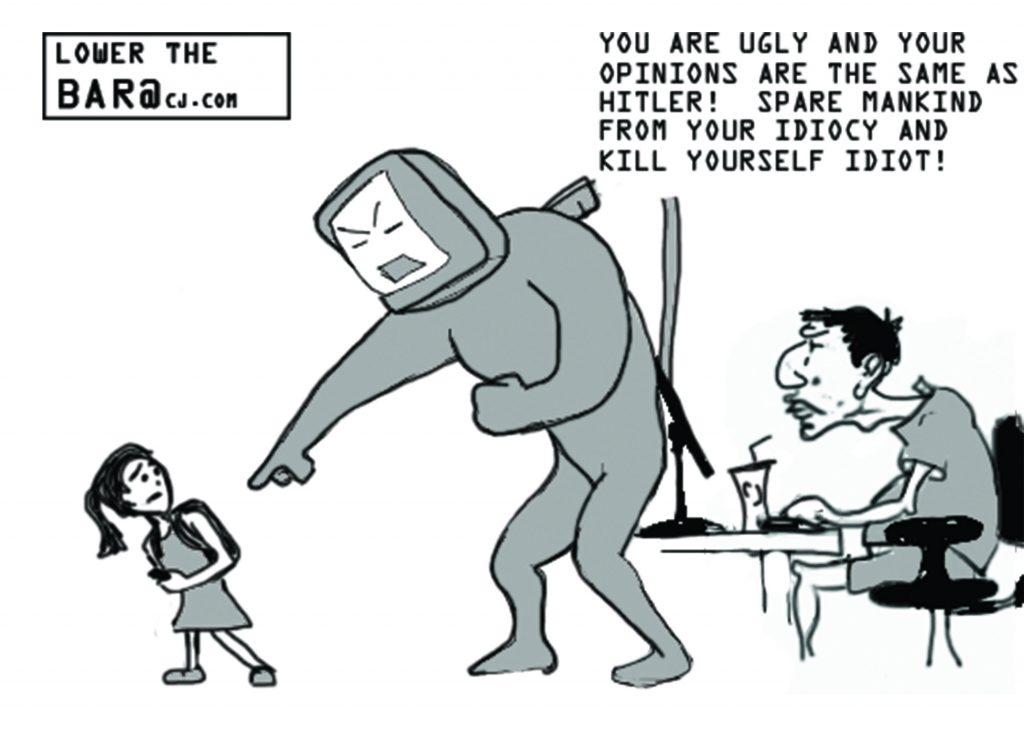
Copy Chief
A group of CSU Bakersfield graduate students is using a class project to spread the word about cyberbullying prevention.
Aarti Khambhaita, Spencer Kirk, and Jasper Westerhoff became the Coalition of Social Workers against Cyberbullying after being assigned a project for their Advanced Policy course.
“What we were tasked to do was identify a social problem, find existing or incoming legislation about that issue, and advocate to …the local, county, state and even federal level for the policy to pass and be implemented,” Kirk said.
Their project is based on two recently introduced California bills. AB-2122 would determine who within a school district can expel students for cyberbullying, while AB-2536 would make all bullying legislation apply to cyber-sexual bullying.
Cyberbullying has existed for years, but defining and regulating it can be challenging.
“I think cyberbullying needs a more solid definition. It’s a gray area,” Khambhaita said.
According to the group’s website, cyberbullying is characterized by willfully and repeatedly harming someone through the use of technology.
The harm in some cases can be significant, and victims of repeated cyberbullying may experience decreased self-esteem, increased depression and anxiety or suicidal actions.
“I think that’s an important reason why we picked this topic, as well: the severe consequences of cyberbullying,” Westerhoff said.
So far, the group has created a website containing definitions of cyberbullying, links to the state bills, resources for victims of cyberbullying and a page for testimonials of cyberbullying experiences.
The group also manages a Facebook page called “Social Workers against Cyberbullying,” and has created a Change.org petition to show support of anti-bullying legislation.
They have reached out to the CSUB community through fliers and emails, and have visited K-12 principals and administrators to raise awareness.
“We reached out to school districts all over California, so we’re not just focusing on Kern County. We’re focusing on California as a whole,” Khambhaita said.
The coalition has received some recognition for its efforts. The group members were recently interviewed by KGET Channel 17 News, and their petition was shared on the Facebook page of the National Association of Social Work’s Sacramento chapter.
The members of the coalition plan to continue their advocacy as social workers even after the class project ends.
According to Westerhoff, other students should take advantage of projects and subjects that interest them.
“If you have a good project or a good topic to discuss as a student here at the university, you can definitely get it out there,” Westerhoff said.
The coalition is focusing on the cyberbullying experiences of children and teenagers, but college students are not immune to this problem.
According to a 2016 article on psychiatrictimes.com by Ellen Selkie and Megan Moreno, common cyberbullying tactics of college students include “electronic criticisms of identity, sexual harassment, and ‘outing’ of private information such as sexual orientation or health diagnoses without consent.”
Students who experience cyberbullying are encouraged to archive offensive posts or messages, tell someone trustworthy, such as a friend, family member or counselor, and report persistent bullying to law enforcement.
The CSUB Counseling Center is free to enrolled students, and the website for the Coalition of Social Workers against Cyberbullying is https://swagainstcyberbull.wixsite.com/socialworkadvocacy.






